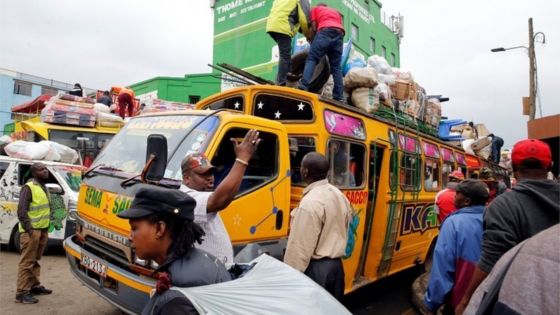
Many Kenyans fear that Tuesday`s fiercely contested general election will trigger ethnic violence between supporters of rival parties, writes the BBC`s Dickens Olewe from the capital, Nairobi.
Soap, long-life milk, maize flour and cooking oil are flying off the shelves of supermarkets in Nairobi as people stock up on foodstuff and other essential items amid fears that violent protests will break out once the result is announced.
"We had one customer who bought 10 pieces of soap today, which is unusual. Long-life milk, tissues, sugar and rice are also popular," said Margaret Wambui, a manager at Sweet World supermarket in Kawangware, a largely informal settlement north of the capital, Kenya.
Despite the booming sales, Ms Wambui says the management decided weeks ago to stop taking stock from suppliers.
"We want to minimise our losses should the store be targeted in a post-election attack. So at the moment we are only buying dairy products from our suppliers which we can sell quickly," she told the BBC.
Brutal murder
Following disputed elections in 2007, some 1,200 people were killed and more than 500,000 fled their homes in violence that took ethnic overtones, involving mostly Kikuyus and Luos - two of Kenya`s biggest ethnic groups.
The 2013 election - in which President Uhuru Kenyatta, a Kikuyu, beat his long-standing rival Raila Odinga, a Luo - was largely peaceful.
Fears of violence in Tuesday`s election, which sees the two men once again vying for power, grew after the brutal murder of the electoral commission`s IT head, Chris Msando.
He had promised to deliver a credible election, free of the rigging which allegedly marred previous elections.
Nairobi and other urban centres have witnessed a mass exodus of people to areas where their ethnic community is dominant.
A Kenya-based online publication, The Elephant, captured the mood in an article entitled, A Silent Panic in Kenya.
It details how people have come up with travel plans to be away from areas they believe are prone to violence.
Although some of those leaving the cities may be going to their rural homes where they are registered to vote.
The manager of a supermarket in a middle-class neighbourhood in Nairobi, who preferred anonymity, said people should stop panicking.
"We have to believe in Kenya," she told the BBC.
"I went through the coup in 1982, and the troubles we`ve had thereafter, and I think we should be firm and get on with our lives, " she added, assertively.
`Threatening language`
Another woman - who runs a hiring service for road construction machinery in Jamhuri estate, west of Nairobi - says she has already bought all the supplies she will need for the next two weeks.
"I have bought extra packets of maize flour, cooking oil and long-life milk," said Anne, who did not want her surname published.
"We are from different ethnic communities here but there are some people who are using language that is threatening and I think we have to take precautions."
Zuma, who runs a carpentry business in the same area, is optimistic that normalcy will be maintained after the election.
He has not been buying extra supplies and says he expects to be at work the day after the election.
"I would have worked on the election day had the government not declared it a national holiday but I plan to be here the next day".
"I believe the electoral commission will deliver a credible election and I think people will be ready to move on," Zuma added.
`Manipulation plot`
Another man the BBC spoke to said he could afford to stock up on food for only three days.
"I would have liked to stock up for more days if I had the money," David Kadondi said.
He believes that Mr Msonda`s murder was linked to a plot to rig the election.
"Msando was key to ensuring the election is credible but they had to eliminate him. The way he was killed shows that his killers are determined to get into the voting system and manipulate it."
Kenyan police are still investigating the murder of Mr Msando, who was killed along with a young woman.
Mr Kadondi remains sceptical about the electoral commission`s assurances that its IT system is tamper-proof.
His friend, Emmanuel Aswani, says he has also been buying supplies: "I have bought maize flour, cooking oil and vegetables for the next two weeks."
"I live next to a main road and if there`s violence then I will be affected, so I have taken the necessary steps to ensure that I will not be going around looking for supplies."
Oliver Wala, who runs a dentistry in a middle-class estate in Nairobi, says that most of his clients have left the country.
"The presidential race will be won by one person and we have to accept that and move on."
"But most importantly we should not let politicians dictate our lives."
More on Kenya`s elections:.


0 comments:
Post a Comment